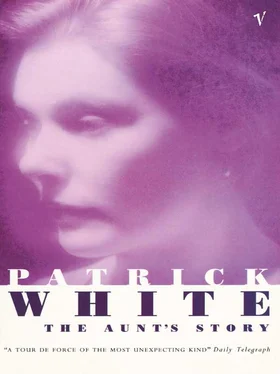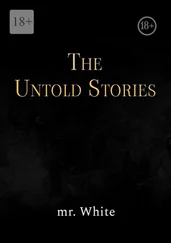‘No,’ said the man. ‘I’ll just slip along.’
Gertie Stepper went quite red. ‘Well,’ she said, ‘at your age, you know best.’
‘And we shall come,’ cried Fanny. ‘We’ll walk at least as far as the bridge. So that you can tell us things.’
But the man had stopped talking. He looked at his boots as he walked, and he sucked the beef out of his teeth. Till Fanny had to shake his arm.
‘Tell us something,’ cried Fanny. ‘Why don’t you speak?’ she said. ‘Soon we shall have gone.’
But inside the man’s silence, Theodora could feel his closeness. The sleeve of his coat touched her cheek. The sleeve of his coat smelt of dust, and mutton fat, and sweat, but it stroked her, and she bit her tongue.
‘Yes,’ said the man, ‘it’s as good a way of passing your life. So long as it passes. Put it in a house and it stops, it stands still. That’s why some take to the mountains, and the others say they’re crazy.’
By this time they had come to the bridge just below Meroã, and this year there was quite a lot of water in the creek, there under the bridge it flowed fast. And for a moment they hung over the rails and looked at the water which flowed under, and they felt good, the man from his full belly, and the children from the solemnity of what they scarcely understood.
‘They say they’re crazy,’ yawned the man. ‘And perhaps they’re right. Though who’s crazy and who isn’t? Can you tell me that, young Theodora Goodman? I bet you couldn’t.’
He looked at her with a fierce eye, of which the fierceness was not for her.
‘I would come if I could,’ said Theodora.
‘Yes,’ said the man. ‘You would.’
‘Don’t be silly,’ said Fanny. ‘You’re a girl.’
‘I would come,’ said Theodora.
Her voice was so heavy she could hardly lift it. Her voice tolled like a leaden bell.
‘You’ll see a lot of funny things, Theodora Goodman. You’ll see them because you’ve eyes to see. And they’ll break you. But perhaps you’ll survive. No girl that was thrown down by lightning on her twelfth birthday, and then got up again, is going to be swallowed easy by rivers of fire.’
And now Theodora began to think that perhaps the man was a little bit mad, but she loved him for his madness even, for it made her warm.
‘Now I must be going,’ said the man. ‘And you young ladies walk off home.’
‘Good-bye,’ said Fanny, shaking hands. ‘Perhaps you will feel hungry and come again.’
‘I’m inclined to say I’d eat my hat, but perhaps for your sakes, perhaps,’ said the man.
‘When?’ asked Fanny.
‘August seventeenth, next year,’ said the man.
‘Good-bye,’ said Theodora.
‘Good-bye,’ he said.
When he had gone Theodora realized that he had not looked at her again, but somehow this did not seem to matter. They sat beneath the shaggy tree in the night of snow, and the snow as it fell melted, on entering the circle of their warmth. She rose and fell on the breathing of the tree.
‘What did he mean,’ said Fanny, ‘by August seventeenth next year? Do you suppose he will come again?’
‘That is what he said,’ said Theodora.
But she knew already that he would not come. In all that she did not know there was this certainty. She began to feel that knowing this might be the answer to many of the mysteries. And she felt afraid for what was prepared. The magpies sang cold in the warm air of Meroã.
WHEN they were older girls they were sent to Spofforths’, so that the Miss Spofforths might finish what Mother had begun. For Mother sometimes lost her patience and threw the book on the floor. It was an event to leave Meroã and go to board at Spofforths’. Even though it was close enough to drive home on Saturday, it remained a terrible event. Like being forced into a room full of people, and the door locked behind. You could not turn and beat on the door, and tell them to open from the other side, because of the stareful and hushed people sitting in the room. You had simply to face the faces. And this was very awful. Goodmans’ pair of brumbies, they used to say in town.
Anyway, Theodora and Fanny Goodman went to Spofforths’, and the door closed.
It was a pale grey house, with a drive up to it, with privet hedges either side, and white windows that could not contain the music that flowed perpetually into the garden, the complicated pieces played by older girls. The garden was full of broken music. There were pauses as well as music. The fuchsias tumbled like detached notes waiting to bridge the gap between bars.
Inside, the house smelt of linoleum and boiled rice. It hummed and vibrated with voices, most of the rooms, except the rooms of the Miss Spofforths, where silence hung in limp leaves of dark, sponged plants, stared with the faces of Old Girls from photographs, and rumbled flatulently after lunch. These were the rooms of the Miss Spofforths. Nobody would ever beat the gong.
All the time this dark green shiny silence was very noticeable beside the golden humming in the other rooms. But this too was frightening, everything was frightening, at first. That first afternoon Theodora Goodman wondered whether she would ever fit into a pattern so elaborate and so refined.
Then a coppery girl with white skin came out on to the landing and said, ‘Hello, Theo, Fanny. It is fun to think we have been put in the same room.’
It was Grace Parrott, who was a familiar face at least. Theodora remembered her mother’s handbag, and the lozenges in the little box that came to Mrs Parrott’s rescue when her pale voice could not find the words. And now Grace Parrott was a copper-coloured lozenge which they seized with relief on the landing at Spofforths’ and were comforted.
‘We also have Una Russell,’ said Grace. ‘She has come from Sydney, for her health. Her father is a jeweller. He is very rich.’
‘Is she all right?’ asked Fanny.
‘Why shouldn’t she be?’ inquired Grace.
But Fanny did not know, or why she had said, except that in desperation she had.
The beds looked very white with their white quilts. Outside the window there was a hawthorn tree. This, decided Theodora, shall be my tree. Screened by its thick quilted white, the words were blurred that the girls rolled into balls with their stockings and put away in drawers.
Una Russell whose father was a jeweller, had a set of silver hairbrushes with irises embossed on the back. Her belt buckle was solid silver, and she wore a turquoise ring.
‘Are there races in this town?’ asked Una Russell.
‘There are picnic races at Sorrel Vale,’ said Fanny.
‘I’m mad about races,’ said Una. ‘Because there’s always the chance you may meet someone interesting.’
‘We know all the people in this district,’ sighed Grace Parrott.
‘Perhaps,’ said Una. ‘But some people start to be interesting all of a sudden.’
The hands of Una Russell had an air of experience, arranging the silver brushes on top of the chest of drawers, that you could not help watch, the pale hands with the turquoise ring.
‘How I hate school,’ complained Una. ‘I would like to get married. I read a lovely book about a girl who got married while she was at school, secretly, you see, to a French count.’
‘Are you allowed to read about love?’ asked Fanny.
But Una did not hear, and immediately Fanny was glad.
‘Aren’t you unpacking, Theo?’ asked Grace Parrott.
Because Theodora sat on the quilt in her big straw hat, and her face was half a brown shadow, the way the brim cut across. The impression was rather strange.
‘You haven’t even taken off your hat,’ said Una.
She looked at Theodora, sensing something that she would not understand, and possibly something from which she must defend herself, or even hate.
Читать дальше












